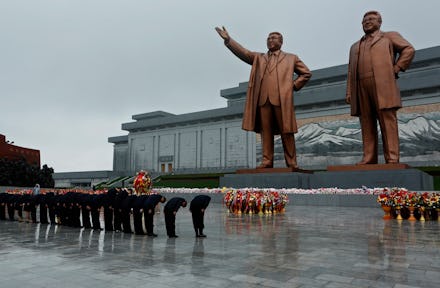What It's Like to Teach Computer Science in a Country That Bans Google

North Korea is known as one of the most isolated places in the world, where the ruling regime controls almost every aspect of life.
So what is it like to be a student in Kim Jong-Un's North Korea? A recent discussion on Reddit with Will Scott, a teacher who just returned from teaching Computer Science at North Korea's Pyongyang University of Science and Technology, offers some interesting insight into life in the country.
Taking part in Reddit's "Ask Me Anything", Scott discussed his experience teaching, as an America, Computer Science to students at North Korea's Pyongyang University of Science and Technology.
The Pyongyang University of Science and Technology is fairly unique to the country for a few reasons: "instruction is in english, and mainly from foreign professors. There were 50-60 professors there this fall, with maybe 20 of them Caucasians (like me). The majority of professors were Korean-American."
But there was still enough in common with the rest of the country to give Scott a pretty good sense of teaching and student life in North Korea.
Here are some of the highlights of the AMA:
1. You can't just "Google it"
As a computer science teacher, Scott said "a lot of CS education really breaks down without access to the internet."
CS learning often relies on Google and similar internet services to solve answers to problems, but thanks to North Korea's heavy censorship, students are not able to do much research for their own answers. Basically, it was almost like teaching about computers before there was the internet.
2. Lack of technology makes research difficult
Aside from difficulties in teaching students, Scott said that in the long term, it's hard to imagine staying for very long because the lack of "consistent power + internet" makes doing much computer science research, although I'm sure the same applies to most academic research today. As a professor, much of the job requires constant research in your field, but this would be nearly impossible in North Korea where there's a severe lack of internet and even available offline resources.
3. It's mostly dudes
When asked if Scott met any ladies during his stay, he responded "it's illegal for North Korean Citizens to marry foreigners." Furthermore, Scott's program was all-male, although the university is looking into opening a school for women — a nursing school.
4. The students love their Dear Leader, but they're like you and me
Many Westerners have a lot of stereotypes about the way North Koreans and North Korean students might act. But in reality, the day-to-day of student life isn't entirely unlike our experience here at home. According to Scott, only about 5-10% of their lives live up to the stereotypes.
For example, "before meals the students would march to the cafeteria while singing patriotic songs," but would then eat, talk, and laugh like normal students for much of the rest of the time.
5. People are normal, as long as you steer clear of politics
Scott met people who were happy to have normal conversations, as long as you stayed clear of "politics / government / foreign policy" (not that surprising I guess).
However, Scott did notice that when he told people he was American, as opposed to another nationality, sentiments toward him quickly turned and people were not nearly as friendly. Plus, some younger students were less than pleased to be taught by a white person, although by their junior and senior years, this became less of an issue.
6. There are two internets
North Korea basically has two internets: the global internet, which is only available to government officials and professors and graduate students at Scott's university and for which a log of all activity is kept, and the intranet or "Kwangmyong," which is an open service available to all North Koreans, and only North Koreans. Because it exists only inside DPRK, all content is heavily censored and monitored.
7. The students get beer
"The students got beer distributed to their dorms a couple times a month because it was part of their ration that they didn't get in the cafeteria," Scott posted regarding food rationing done by the government. There's also a microbrewery pub in Pyongyang with clever beer names like #1, #2, #5, and #6.
8. Nobody wants to say no
In the AMA, Scott said he thought an apparent aversion to saying "no," was one of the most cultural shocking parts of his stay. Instead of giving a straight "no" to a request, many times a question would simply be pushed back with multiple temporary excuses until you basically just gave up asking.